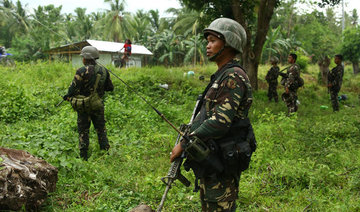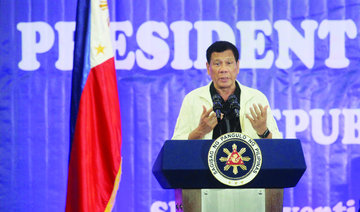MANILA: The Philippine military and police have recommended the extension of martial law in Mindanao because of what they describe as continuing threats by militant groups and violent incidents by the Maoist New People’s Army (NPA).
Local officials have agreed to extend martial law on the island, but stressed that this should not be used to curtail the movement of people.
Speaking to Arab News, Zia Alonto Adiong, Lanao Del Sur first district assemblyman, said that verified information had been received that there was recruitment activity by Daesh-inspired militants groups.
Maj. Gen. Restituto Padilla, spokesman for the Armed Forces of the Philippines (AFP), also confirmed the recruitment by the Maute Group and the Abu Sayyaf Group (ASG), which were responsible for the Marawi siege.
According to Adiong, the aftermath of the Marawi siege and the liberation of the city from Daesh-back militants does not end the battle against violent extremism.
“The peace and order situation has yet to be stabilized as we proceed with the early recovery efforts for Marawi. If it requires martial law to be extended to guarantee the security of our communities and the safety of our people, and the assurance that recovery efforts will not be interrupted, then by all means let’s have it extended,” he said.
However, Adiong said that the main concern of local government was the safety of constituents. If martial law was extended, “it should serve its real purpose faithfully” to find the “culprits and the suspected supporters (of terror groups). It should not be used as a means to curtail the movement of the people.”
Efforts were currently focused on helping those affected by the crisis to start up businesses and go back to normal life, he said. “I think the martial law today, as we have observed, should be maintained in a way that will not impose more limitations or additional security protocol and ... limit the movement (of the people).”
He said that martial law as a security response to the Marawi siege has its own limitations based on the 1987 Philippine constitution.
“It only suspends the privilege of the writ of habeas corpus. Its primary objective is to arrest and apprehend suspected financiers and supporters of the Maute Group. It doesn’t replace civilian authority, compared to the previous martial law regime in the 1970s,” he said.
On the continued presence of terror groups in Mindanao, Adiong said: “The threat is still there. Because these violent, violent extremists, these people don’t know when to stop unless they think they are successful in putting up their own political system based on a caliphate that they want to set up.”
“Unless they are able to do that and be successful enough to establish it in at least in some parts of the country, then they will not stop. We know that for a fact, so that’s why the threat is still there,” he said.
Zamboanga City Mayor Maria Isabel Climaco Salazar also reportedly recommended extending martial law in Mindanao to strengthen the fight against terrorism and threats from the NPA.
In a press briefing in Malacanang, Maj. Gen. Padilla said the AFP has recommended the extension of martial law in Mindanao, but could not say for how long the extension would be.
Padilla cited continuing threats by Daesh, Bangsamoro Islamic Freedom Fighters (BIFF), and Abu Sayyaf Group (ASG) as reasons for the extension. He said increasing violent incidents perpetrated by the communist rebels, following the president’s declaration to formally end peace talks with them, was something the government needed to be vigilant about.
Department of National Defense (DND) spokesman Arsenio Andolong said that the recommendation was based on the assessment provided by ground commanders in Mindanao, which was carefully considered against the backdrop of the prevailing and future security environment. “It is now up to the president to decide whether to adopt it or not,” he said.
























